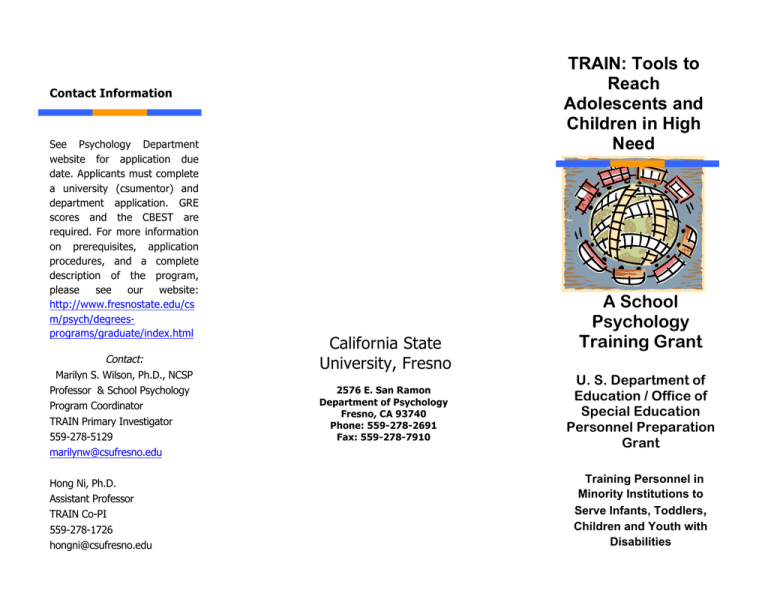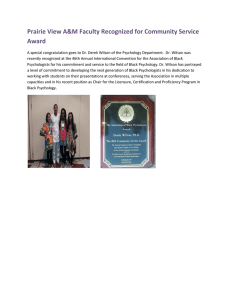TRAIN: Tools to Reach Adolescents and Children in High
advertisement

TRAIN: Tools to Reach Adolescents and Children in High Need Contact Information See Psychology Department website for application due date. Applicants must complete a university (csumentor) and department application. GRE scores and the CBEST are required. For more information on prerequisites, application procedures, and a complete description of the program, please see our website: http://www.fresnostate.edu/cs m/psych/degreesprograms/graduate/index.html Contact: Marilyn S. Wilson, Ph.D., NCSP Professor & School Psychology Program Coordinator TRAIN Primary Investigator 559-278-5129 marilynw@csufresno.edu Hong Ni, Ph.D. Assistant Professor TRAIN Co-PI 559-278-1726 hongni@csufresno.edu California State University, Fresno 2576 E. San Ramon Department of Psychology Fresno, CA 93740 Phone: 559-278-2691 Fax: 559-278-7910 A School Psychology Training Grant U. S. Department of Education / Office of Special Education Personnel Preparation Grant Training Personnel in Minority Institutions to Serve Infants, Toddlers, Children and Youth with Disabilities Training Career Opportunities TRAIN: Tools to Reach Adolescents and Children in High Need This project aims to improve preservice training of school psychologists to serve children with disabilities from high need backgrounds. The project targets elementary children for early intervention who are migrant or new immigrants and achieving far below grade level. At the secondary level the project focuses on knowledge and implementation of interventions with students who are incarcerated, in foster care or continuation programs. LEA partners provide opportunities for field placements with students who are new immigrants, migrant, foster youth, or in alternative education/ juvenile justice system. Project objectives are to (1) add course content on academic and behavioral empirically-based interventions with students who are at risk of education failure because of disability and/or environmental factors and (2) provide practicum placements where school psychology graduate students can develop and implement academic and behavioral interventions with high-need students. There is a national shortage of school psychologists which is anticipated to grow over the next decade. The need for diversity in the field is critical. In California 2/3 of students are from minority backgrounds while ¾ of school psychologists are Caucasian. There is as great need for school psychologists who are bilingual and/or from ethnic and racial minorities. Our school psychology program provides students with training in behavioral interventions and mental health, as well as traditional school psychology roles. To date all graduates of our program have obtained employment in the field. School Psychology at Fresno State The school psychology program at Fresno State is an Ed.S. program accredited by the state of California and fully approved by NASP since 1994. It is a 3-year full-time program. Approximately ten students are accepted per year. Program faculty are active in research and the profession locally and at the state and national levels. Student mentoring is an integral part of the program. • • • • • • Academic assessment and intervention aligned with RTI Behavioral assessment and interventions, including FBA and BSP Consultation with teachers and families Culturally competent cognitive, and socio-emotional assessments Diverse field placements for service learning, practica, and internship: varied SES, ethnicities, cultures, and population density Mental health services, including cognitive behavior / solutionfocused individual therapy and group counseling Student Support The TRAIN Project offers financial support to student in the first and second year of the school psychology program. Stipends up to $6000 per year may be provided for fees, books, and other expenses. In addition, travel funding for professional conferences is available. This financial support is intended to encourage applications from people who otherwise might not be able to afford a fulltime program, and if accepted, allow them to focus on professional development.



